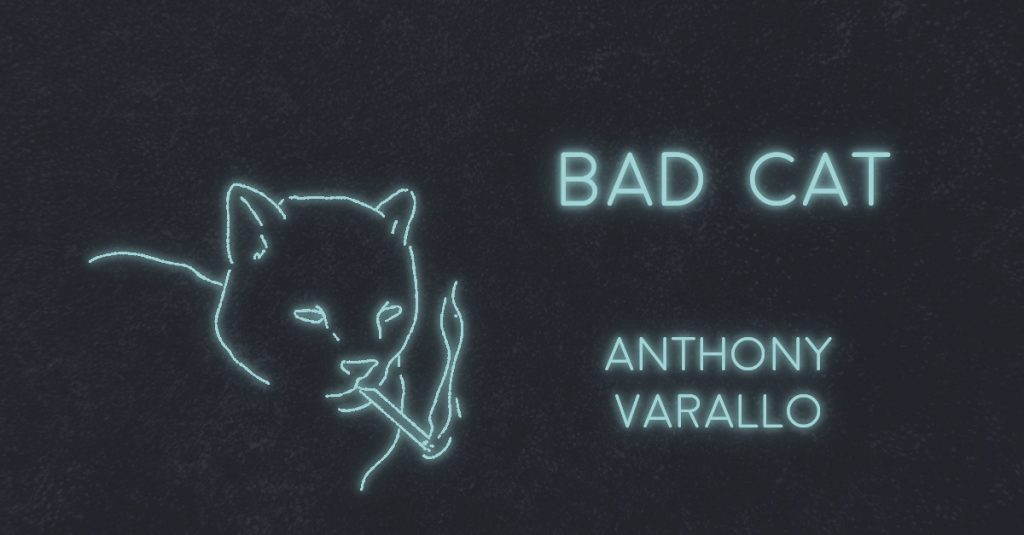Yesterday I met the bad cat. He was lying on our neighbor’s driveway, sunning himself in the last of the day’s warmth. He had gray fur, slightly mottled with black, and white paws. His eyes were closed, restful. When my family and I walked past, the cat yawned and stretched his tongue the way cats sometimes do. The cat blinked at us for a moment, curiously—pleasantly, I thought.
“Here kitty-kitty!” I said. “Psst-psst!”
“Dad,” my daughter said, “don’t do that.”
“Do what?” I said. “Cats love that sound.”
“Please, Dad,” my daughter said. “It’s embarrassing.”
“Plus,” my son said, “I think there’s something wrong with that cat.”
“Don’t be ridiculous,” I said, and lowered my hand to the ground, as if I were cradling food, a trick from my childhood that had never failed to lure our cat, Pumpkin, out from beneath my bed. “Psst-psst! Here kitty! Hungry for a little snack?”
The cat blinked his eyes once more at me, and stood. Interested.
“Dad,” my daughter said, “don’t trick him.”
“It’s not a trick,” I said.
“He thinks you have food,” my son said.
“He’s not going to be happy,” my daughter said.
“The kids have a point,” my wife said. She’d been checking out her new iPhone for the past few minutes. The walk had been her idea: we’d take a nice selfie of us walking in the neighborhood and then post it when we got home. This time of evening, the light was soft, perfect. “That cat looks a little scraggly.”
“He’s not scraggly,” I said. I crouched to the ground and made eye contact with the cat. “Psst-psst! Here kitty!” But the moment I said it, I noticed the weeds and sticks and briars clinging to the cat’s underbelly.
“Dad,” my daughter said.
“Honey,” my wife said. “Maybe you shouldn’t.”
“You guys are being ridiculous,” I said. But, as the cat clicked closer—one of his rear legs tapered to a wooden peg that clicked atop the asphalt—I saw that his teeth were preternaturally large and that his left ear was held together by what seemed to be industrial staples and barbed wire.
“Dad, don’t,” my son said.
But I wouldn’t let up. I made the “psst-psst” sound even louder, and pretended to dip one hand into the other, then place something presumably yummy into my mouth. That had always worked with Pumpkin. Do that with Pumpkin, and ten seconds later he’d be purring at your feet, only too glad to have you pet him with your not-actually-holding-food hand.
“Honey,” my wife said. “I think that might be a bad cat.”
“He’s not a bad cat,” I said, as the cat approached. Up close, I could see that his fur wasn’t actually black and gray: the black was really a little leather jacket studded with rivets, from which something I would soon learn was a switchblade bulged. The cat was smoking a tiny cigarette, which sent smoke into his crusted, bloodshot eyes.
“Here kitty-kitty,” I said.
“Dad,” my daughter said.
When the cat nudged my hand with his nose ring, I opened my fingers to show him that there was nothing inside.
“Ta-da!” I said.
There was a moment I would like to dwell upon here, if I might. A moment when the cat looked at me with genuine surprise and perhaps even more genuine disappointment, before everything else unfolded. I felt, in that moment, as fleeting as it was, that the cat understood something about me, about my lonely childhood, those long summer days playing umpteen bazillion games of hide and seek with Pumpkin, or persuading Pumpkin to watch cartoons with me on the family room sectional, or me reading all of my old Hardy Boys books to Pumpkin, who often needed me to point out the clues. It was, I would like to think, a special moment, one I know I won’t long forget.
And then the moment passed.
The first cuts of the switchblade weren’t too bad; it was the nunchucks that really smarted. What with the way the bad cat struck them expertly against our ankles, to get the most pain. He was good at working them with one paw while thrusting the switchblade with the other. When the bad cat bit my hand while simultaneously stabbing and nunchucking the rest of my family, I knew I should have been angry, but I couldn’t help it: I felt a little proud.

